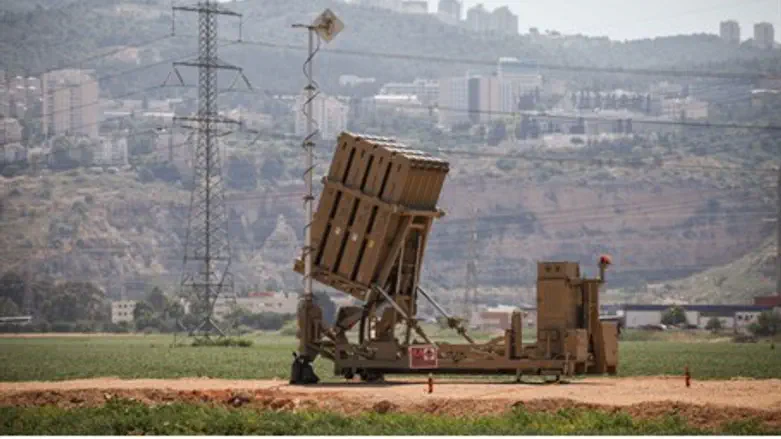
With the security establishment reportedly rehearsing for nightmare scenarios involving up to 4,000 Israelis killed in the initial days of a war with Iranian proxies, the questions arise: is Israel truly prepared for such a scenario? How is it acting to prevent it from materializing? And – what will Israel do if such horrific carnage among its civilians is, indeed, inflicted?
One tends to trust that Israel's leadership is prepared for all eventualities, but sounds coming from Prime Minister Binyamin Netanyahu and former prime minister Ehud Barak, who was also defense minister under Netanyahu, are not necessarily reassuring.
Barak, in particular, sounded last week like a prophet of doom, or perhaps a former leader trying to prepare an alibi for himself, should things turn bad. After all, it was Barak who enabled Hezbollah to take a firm hold of Lebanon, and to effectively turn it into a huge missile base, by hurriedly withdrawing the IDF from there in 2000.
Barak essentially said that Israel was not prepared for the threat: “We have not really dealt with 100,000 rockets, and we have not started to deal with the matter of their accuracy,” he said. Iron Dome and such anti-missile defenses could not deal with the challenge, he warned, and citizens would be in for a great shock when accurate missiles – as opposed to the inaccurate variety they have been used to – begin raining down on them.
With Hezbollah rockets in Lebanon numbering at least 100,000, the sheer number of rockets that could rain down on Israel would overwhelm Iron Dome – which Barak admitted was too expensive to provide effective defense against such an all-out attack.
Netanyahu gathered reporters to tell them that "Iran is seeking to cover Israel with intense fire,” and that in Lebanon, “the Iranians are inserting the most advanced weapons in the world, and strengthening Hezbollah, so that it can hit any spot in Israel.”
Defensive option 'partial'
Brig. Gen. (res.) Moni Chorev, who specializes in military and strategic doctrine, told Arutz Sheva Sunday that “it is completely clear that in the near future, Israel's defensive option in the face of the Hezbollah threat from Lebanon – if fully manifested – is a partial one.”
Chorev, a former division commander and commander of the IDF officer school, explained that he was referring to the IDF's ability to defend population centers and “relevant strategic facilities.”
A ground maneuver would presumably also not be able to quickly reach all of the places from which the missiles were being fired, he said, and counter-fire by IDF artillery and air force would also not destroy the threat in the short term either.
Given this situation, Chorev explained, the IDF's deterrence depends on “a serious debate about what can be achieved on the basis of the laws of warfare and the necessary morality.”
“The military tool in itself is insufficient,” he said. However, deterrence can be achieved by non-military means as well. "It is completely wrong to look at a campaign like this without taking into account actions on the diplomatic plane, the media and consciousness plane, and the economic plane. A national campaign combined with a military one is needed,” said Chorev.
Threat and counter-threat
A senior IDF officer warned last week that in the next war, Israel would create 1.5 million Lebanese refugees, who would presumably stream northward from southern Lebanon, as has happened in previous wars. To this, Hezbollah's leader Hassan Nasrallah replied that his organization would displace millions of Israelis in much the same way.
This could be seen as a relatively acceptable balance of fear if it were not for the fact that in such a war, Hezbollah would be fighting as an Iranian proxy. Therefore, any real deterrence Israel would have would be achieved by threatening Iran – not Lebanon.
All this makes crystal clear why Israel can never allow Iran to achieve a nuclear option. Even if one deems Iran sane enough to fear an Israeli nuclear counterstrike to an Iranian nuclear strike – what would Israel's deterrence be against a conventional “carpet bombing” by missiles through an Iranian proxy? This threat, with an Iranian nuclear option in the background, would be very hard to counter.
The crazy factor
On the positive side, Israel is reportedly making new friends in the Middle East – namely, Arab regimes that are even more afraid of Iran than Israel is. The leading regime in this category, Saudi Arabia, is currently spearheading a war against Iranian Houthi proxies in Yemen.
Another positive element, for Israel, is the fact that Hezbollah and Iran are currently fighting what seems like a losing war in an attempt to prop up Bashar Assad against ISIS and other Sunni forces in Syria. Should the Assad regime fall – the direct land connection between Iran and Hezbollah would be cut off, and Hezbollah itself may find itself on the defensive in Lebanon.
We have not yet begun to discuss the possible fallout – literal and figurative – from accurate missile hits on chemical and nuclear sites in Israel, as well as hits on the electric grid and other essential infrastructure. Nor have we imagined how Arab forces from Judea and Samaria, or even Israeli Arabs, could join in the fighting.
Perhaps the most basic question regarding Israel's deterrent force is what one could call the “crazy factor.” Specifically – is Israel's leadership perceived as sufficiently “crazy” to respond immediately to an all out attack with one of its own – that could create mass destruction and carnage on the other side?
If the worst threat Israel is able to utter involves creating refugees in an Iranian proxy state – our situation is not very good. Perhaps it is time for Netanyahu to talk less about "responsible leadership," as he likes to do, and project a little more crazy.